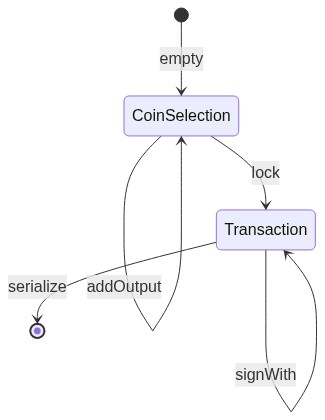Cardano Transactions
Overview
This library provides a simple interface for building transactions on Cardano. It also provides a small command-line interface for playing around in a terminal.
Installation
Building from source
- download haskell stack
- clone this repo:
git clone https://github.com/input-output-hk/cardano-transactions.git - cd into the project:
cd cardano-transactions - install:
stack install(the binary will be in~/.local/bin/cardano-tx)
Download binaries
Check the release page for binaries.
Docker container
Run:
# build (run inside the project dir)
docker build -t inputoutput/cardano-transactions .
# simple run
docker run --rm inputoutput/cardano-transactions --help
# interactive shell (to pipe commands)
docker run --rm -ti --entrypoint sh inputoutput/cardano-transactionsThe docker image is alpine, so tools can be installed as follows in an interactive shell:
apk add --no-cache nano git curlPayment
We call Payment a simple UTxO transactions with no metadata, moving funds from a set of inputs to a set of outputs.
Payments are constructed from a small set of primitives, following the given state-machine:
Example (Haskell)
Imports
```hs {-# LANGUAGE NumericUnderscores #-} {-# LANGUAGE OverloadedStrings #-} import Data.Function ( (&) ) import Data.Maybe ( fromMaybe ) import Data.UTxO.Transaction.Cardano.Byron ( fromBase16 , fromBase58 , mkInput , mkOutput , mkSignKey , testnetMagic ) import qualified Data.ByteString as BS import qualified Data.UTxO.Transaction as Tx ```Constructing Inputs / Outputs
```hs -- Say we want to construct a transaction from a known input to two -- different addresses. Let's start by constructing the primitive types -- for /Byron/ by using the smart-constructors from: -- -- 'Data.UTxO.Transaction.Cardano.Byron' let (Just input0) = mkInput 0 =<< fromBase16 "3b40265111d8bb3c3c608d95b3a0bf83461ace32d79336579a1939b3aad1c0b7" let Just key0 = mkSignKey =<< fromBase16 "e0860dab46f13e74ab834142e8877b80bf22044cae8ebab7a21ed1b8dc00c155\ \f6b78eee2a5bbd453ce7e7711b2964abb6a36837e475271f18ff36ae5fc8af73\ \e25db39fb78e74d4b53fb51776d0f5eb360e62d09b853f3a87ac25bf834ee1fb" let oneAda = 1_000_000 let (Just output0) = mkOutput oneAda =<< fromBase58 "2cWKMJemoBajc46Wu4Z7e6bG48myZWfB7Z6pD77L6PrJQWt9HZ3Yv7o8CYZTBMqHTPTkv" let (Just output1) = mkOutput oneAda =<< fromBase58 "2cWKMJemoBaiLiNB8QpHKjkQhnPdQSyxaLb8JJFUQYpiVzgEJE59fN7V7StqnyDuDjHYJ" ```Constructing The Transaction
```hs -- Next, we can construct the transaction using the DSL provided by: -- -- 'Data.UTxO.Transaction#MkPayment' let eitherTx = Tx.empty testnetMagic & Tx.addInput input0 & Tx.addOutput output0 & Tx.addOutput output1 & Tx.lock & Tx.signWith key0 & Tx.serialize ```Writing Binary Transaction to a File
```hs -- Finally, let's export the binary transaction to a file, if we didn't screw -- up the in the above example ^^" case eitherTx of Left e -> fail $ show e Right bytes -> BS.writeFile "transaction.bin" bytes ```Example (CLI)
cardano-tx empty 764824073 \
| cardano-tx add-input 0 3b40265111d8bb3c3c608d95b3a0bf83461ace32d79336579a1939b3aad1c0b7 \
| cardano-tx add-output 42 Ae2tdPwUPEZETXfbQxKMkMJQY1MoHCBS7bkw6TmhLjRvi9LZh1uDnXy319f \
| cardano-tx lock \
| cardano-tx sign-with e0860dab46f13e74ab834142e8877b80bf22044cae8ebab7a21ed1b8dc00c155f6b78eee2a5bbd453ce7e7711b2964abb6a36837e475271f18ff36ae5fc8af73e25db39fb78e74d4b53fb51776d0f5eb360e62d09b853f3a87ac25bf834ee1fb \
| cardano-tx serializeAbout Library Dependencies
This library requires quite a few exotic dependencies from the cardano realm which aren't
necessarily on hackage nor stackage. The dependencies are listed in stack.yaml,
make sure to also include those for importing cardano-transactions.
Documentation
API documentation is available here.
End-to-end example of constructing transaction via cardano-tx and then submitting it.
Contributing
Pull requests are welcome.
When creating a pull request, please make sure that your code adheres to our coding standards.




